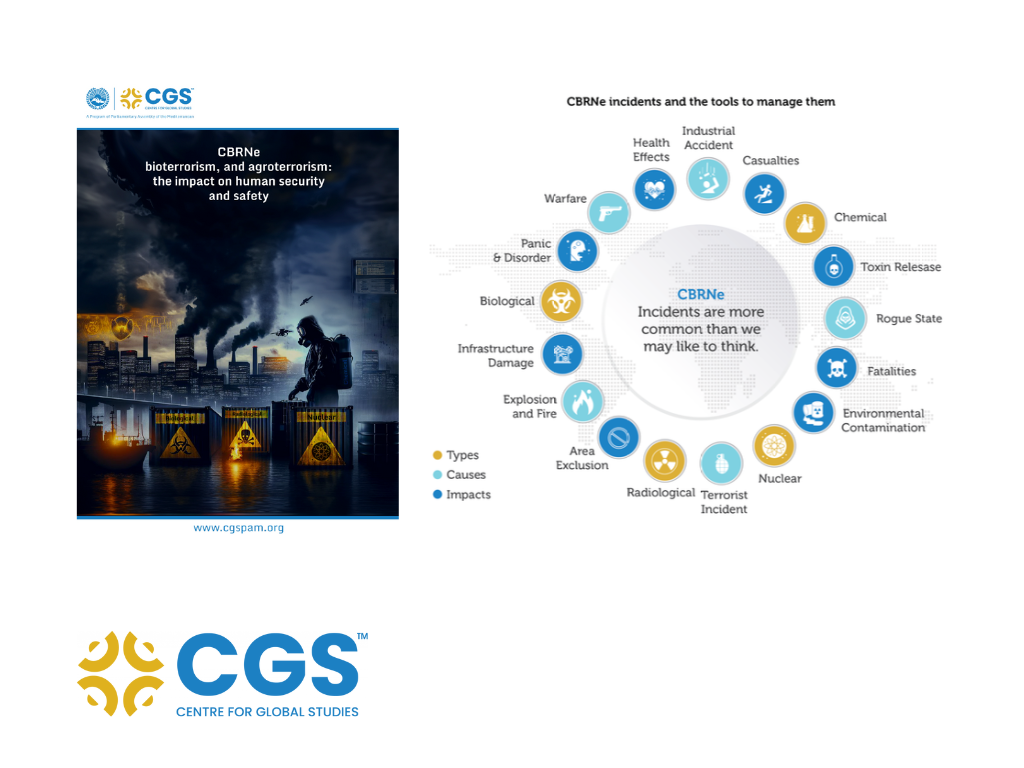
20 November 2024, San Marino – The PAM Centre for Global Studies (CGS), under the chairmanship of Amb. Dr. Abdulsalam AlMadani, today released a report entitled “CBRNe, Bioterrorism, and Agroterrorism: The Impact on Human Security and Safety”, prepared in collaboration with the European Centre for Disaster Medicine of the Council of Europe (CEMEC), FAO and other international experts.
The report, now available in English on the PAM–CGS websites, builds on the excellent cooperation between PAM and CEMEC, formalized by a Memorandum of Understanding (MoU) signed on 5 June 2023, on the occasion of the visit of Hon. Enaam Mayara (Morocco), President of PAM, and Professor Roberto Mugavero, President of CEMEC. The French and Arabic versions of the report will be published soon.
Focus of the report are the threats posed by chemical, biological, radiological, and nuclear (CBRNe) incidents, bioterrorism, and agroterrorism, all of which present significant challenges to global security and One-Health environment.
The report stresses the necessity of well-developed training and readiness strategies to effectively manage emergencies involving CBRNe, bioterrorism, and agroterrorism, particularly on food production and processing. It calls for heightened attention to the preservation of human security and public health, urging parliamentarians, government officials, civil protection agencies, and volunteer organizations in the Euro-Mediterranean and Gulf regions to adopt comprehensive frameworks for response.
Key legislative measure addressing bioterrorism is the European Council Regulation (EC) No. 851/2004, which establishes the European Centre for Disease Prevention and Control (ECDC) to counter health threats effectively. Additionally, Regulation 852/2004 outlines critical hygiene standards for the food industry. On the global stage, the Biological Weapons Convention (BWC) prohibits the development and stockpiling of biological weapons, while UN Security Council Resolution 1540 mandates state-level prevention of biological weapons acquisition by non-state actors.
The report further highlights the enhanced cooperation between the European Union and the Gulf Cooperation Council (GCC) on economic relations, climate change, energy, environment, and research, as well as efforts by the EU, the MENA region, and the United States to improve CBRNe preparedness and response capabilities.
With regard to food safety and security, the report raises concerns over the vulnerability of the Euro-Mediterranean and Gulf regions, particularly in light of the growing threats to food safety posed by agroterrorism.
The interconnected nature of contemporary crises underscores the need for integrated approaches that prioritize human security and One Health principles. To address these challenges, the PAM-CGS advocates for reviving and strengthening the Euro-Mediterranean and Gulf Network for Food Safety, Security, and Health, expanding the scope of the PAM-CGS International Parliamentary Observatory based in San Marino, and fostering deeper regional and global collaboration through frameworks such as the EUR-OPA Major Hazards Agreement. These strategic actions aim to enhance preparedness, resilience, and sustainable solutions in the face of complex threats.
At present, CGS is leading a new major study on One-Health and animal welfare, including new diseases threatening the wellbeing of ruminants in the Euro-Mediterranean and Gulf regions, and their impact on food security and related economic production and supply chains.//

